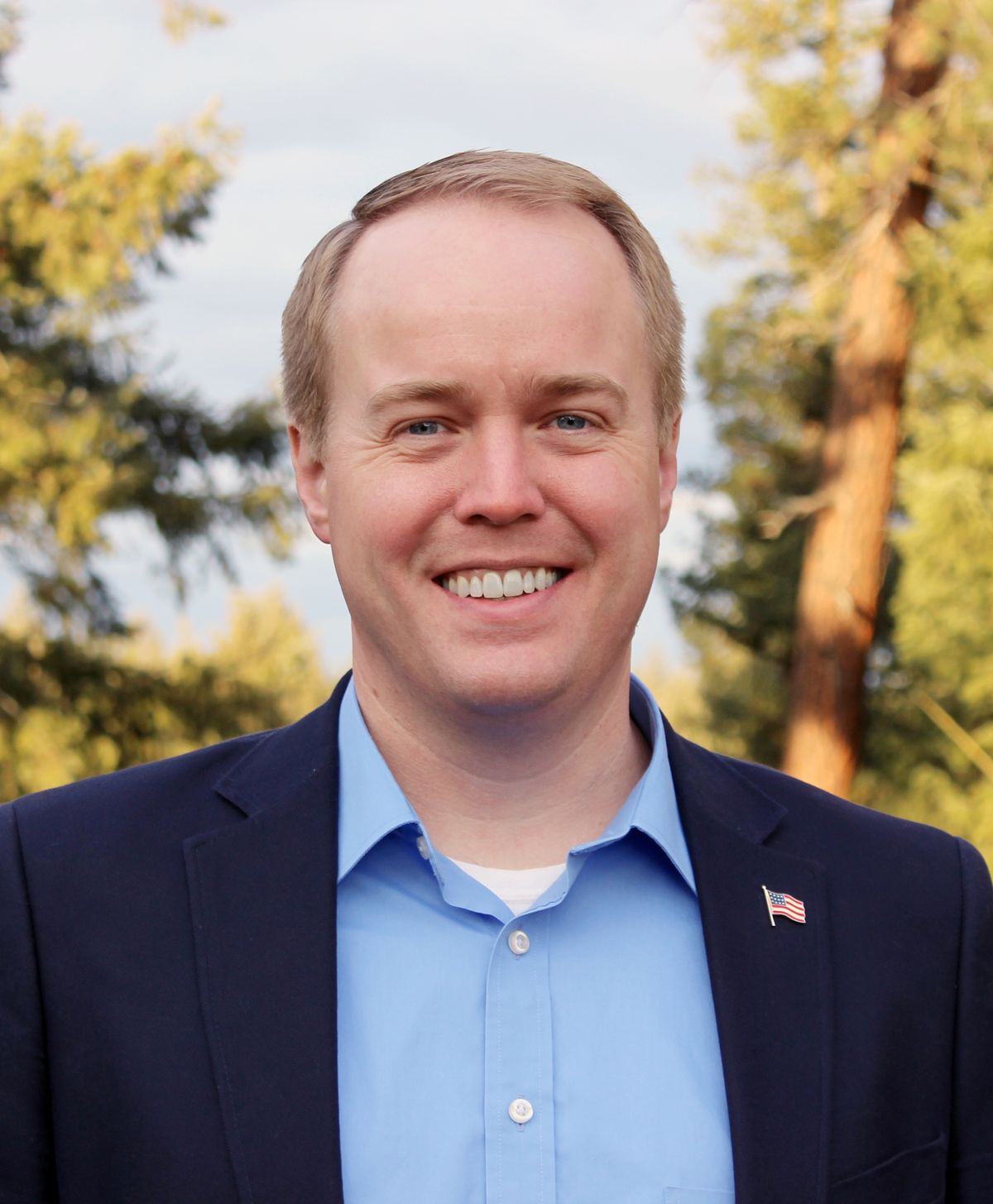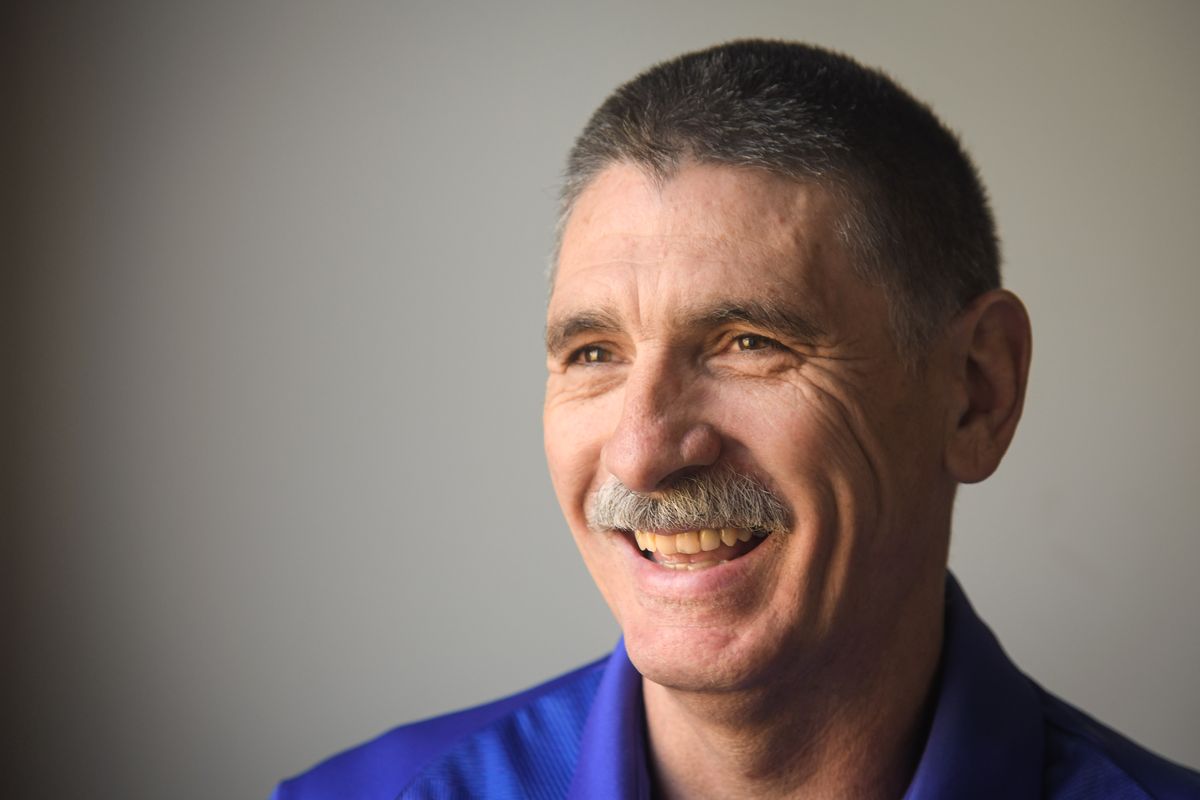County Commissioner candidates Josh Kerns, Ted Cummings agree community needs help getting through COVID-19, differ on criminal justice
Ted Cummings, who raises cattle in Chatteroy, is running against former legislative aid and incumbent Josh Kerns for Spokane County Commissioners.
Spokane County Commissioner candidates Josh Kerns and Ted Cummings disagree on criminal justice issues and how the county should interact with unions, but have similar positions on at least one front: Both say the county should be willing to use county funds to assist people in need after federal money runs out.
Kerns, a Republican who is running for re-election, won the seat in 2016 after he beat incumbent Nancy McLaughlin in the primary and defeated Spokane City Councilwoman Candace Mumm in the general election. Since taking office, Kerns said he’s focused on business growth, and said he’s held true to his goal when he was first sworn into office, raising taxes as a last resort.
Kerns’ promise to ”hold the line on taxes” generated some controversy after he was elected when commissioners voted to put a property tax increase on the ballot to balance the budget. Kerns said when he’s had a chance to vote on tax and fee increases directly, he’s voted no, voting against taking the 1% increase in property taxes the county is allowed under state law, and against other fee increases. But in his run in 2016, he criticized McLaughlin for voting to put taxes on the ballot while she was a Spokane City Councilwoman.
“There’s a lot of governments out there that if they see a shortfall or they see some sort of issue as far as funding, the first thing they jumped to is ‘Let’s raise taxes,’ ” he said. “My promise was that I would try to to examine every other option that was available before raising taxes.”
Kerns said his votes to put tax increases on the ballot, or his support for eventually putting a new jail on the ballot, was not raising taxes, because the voters ultimately decide if they will pay more.
His opponent, Cummings, is a Democrat and chairman of the clerical and technical unit for United Steelworkers Local 338, and raises cattle on his ranch in Chattaroy. Cummings said he agreed increasing taxes should be a last resort, but said commissioners need to use a more people-based approach when making decisions, especially in the criminal justice system.
“We’ve got to remember we’re not just talking about statistics, these are human beings,” he said.
Cummings said commissioners should avoid any policies that could lead to more people incarcerated in the Spokane County Jail, and instead focus on the root causes of why they entered the criminal justice system, and what programs could help them from committing new crimes. Cummings said he would prefer to work with the current jail facilities to make them safer for inmates and county employees instead of building a new jail, and opposes any increase to capacity. He said he might consider a new jail if it was less expensive than maintaining and altering current facilities, and if it didn’t add more beds.
“Here’s my position: We’re not adding to the capacity of people we lock up, so let’s work back from there on how we’re going to reduce that,” he said. “That’s going to have a lot of tension, a lot of push back, but that’s the conversation I want to have and the direction I would go as a county commissioner.”
Cummings said he is concerned about militarization of police and sheriff deputies. He said he understands why some tools are needed for search and rescue or day-to-day operations, but said commissioners should examine the public safety budget and review how much funding should go to training and how much goes to equipment.
“I have nothing but respect for law enforcement. I want to keep them safe, I want them to go home,” Cummings said. “But the militarization of our police force sends the wrong message and gives us horrible results.”
Kerns said he hadn’t considered taking away some equipment or changing funding for the Sheriff’s Office because much of the equipment the Sheriff’s Office uses that could be considered militarized is needed for search and rescue, bomb disposal and other dangerous situations.
“There are instances where they are in a setting where they are being shot at,” he said. “We have a heavily armored truck that responds to bomb scares and it goes out more often than you think. It’s certainly appropriate for law enforcement to have access to (what they need) for the situations that they’re placed in.”
Kerns said the county already had some diversion programs, which commissioners support, such as veterans court, drug court and a diversion program at Geiger Corrections Center that trains inmates for construction work. He also pointed to the Mental Health Crisis Stabilization Facility, an alternative to jail that will be available for around 40 people at a time who have been arrested and have mental health and substance abuse issues. It is expected to open next year.
Kerns said the commissioners have supported some diversion programs and alternatives, but argued that the outcome is often dependent on judges.
“I think it’s important to point out as far as the jail, commissioners don’t arrest, don’t charge and don’t prosecute,” he said. “(We) don’t determine whether they’re released on their own recognizance. We don’t have the jurisdiction to tell (judges) to do it differently.”
Kerns said he also has not yet made a decision on whether a new jail should be bigger, but said once commissioners come up with a plan for a new facility, he supports putting a bond measure on the ballot.
He said his position on the size of a jail would depend on data from the JFA institute, a nonprofit that evaluates criminal justice practices, population growth, programs available to inmates and the philosophy of other stakeholders in the criminal justice system including judges.
“Once that is all ironed out, I would send that to the voters because that was a decision that should be made by the voters,” he said.
Kerns and Cummings also disagree on how the county should handle union negotiations. Kerns and County Commissioner Al French previously voted to require union negotiations in 2018 between the county and unions to be open to the public, arguing it improves transparency. The county has delayed implementing the requirement due to a court case over the same issue in Lincoln County.
“What’s being negotiated with is our taxpayer dollars,” Kerns said, “I think that’s something that should be done out in the open.”
Cummings and union groups have opposed opening negotiations to the public, arguing it undermines unions, makes bargaining more difficult and allows politics into the process.
Parties need to have the freedom to speak candidly and explore different positions,” Cummings said, “Members, or the public at large, can cause an uproar and distractions.”
Cummings also accused Kerns of undermining unions and of having ties to the Freedom Foundation, a organization that advocates against union causes. Kerns said he has never tried to interfere with county employees union membership and said the Freedom Foundation has only made a presentation to county commissioners, and he did not have contact with the organization outside of that until after the requirement was passed.
“They came and made a presentation and that was it,” he said.
After commissioners approved the requirement, Kerns said he did accept a request for a video interview with the Freedom Foundation, which is posted on their website. In the interview, Kerns touts the organization as a “great resource” for templates for similar open meeting requirements.
One area where Kerns and Cummings have slightly similar approaches is reopening the economy.
Kerns initially had pushed for reopening sooner this summer, but he and other commissioners decided to wait after the governor turned down their request and COVID-19 numbers spiked. Kerns said commissioners wouldn’t advocate for anything unsafe and had allocated money for free personal protective equipment before asking the governor to allow them to move into the next phase of reopening.
He said he does not plan to advocate for reopening again until cases go down.
“If we see the numbers continue to decline, it’s something we would consider,” he said. “At this point, we can’t even make that ask, the governor has paused all moving amongst the phases.”
Cummings said he would follow whatever advice health officials gave and wouldn’t consider advocating for reopening until they gave the go ahead.
Both candidates said if financial hardship continues until January, when the county’s $91 million in federal coronavirus relief aid expires, they would look into using other funds the county has available to continue helping families struggling with rent or food. Kerns said he would first look to the county’s Community Development Block Grant funds, which the county receives from the federal government under normal circumstances, as a source of aid .
“I don’t want to see people in our community go hungry, that’s absolutely something I want to consider,” Kerns said.
Cummings said he also would consider using what county funds were available if many were still in need once federal aid expires at the end of the year.
“It’s vital we help all people hammered by this,” Cummings said, “If we need more, we need to figure out where that’s going to come from and stop people from becoming homeless.”
Issues
Should union negotiations be open public meetings?
Kerns: Yes. Notes commissioners are negotiating with taxpayer dollars and says it adds another layer of transparency.
Cummings: No. Says both parties need to be able to speak candidly and that opening negotiations to the public could politicize the process.
Would you ask voters for a tax increase to build a bigger jail?
Kerns: Possibly, but says he has not yet decided if a jail should be bigger, smaller or the same size. Says once he has the data he would put whatever proposal commissioners decide on the ballot.
Cummings: No. Opposes any plan that leads to more people incarcerated. Says he would only consider a new facility if the current one becomes unsafe and it would not result in more people incarcerated.
Would you support advocating for the county to reopen or move to Phase 3 of the governor’s re-opening plan this fall?
Kerns: Possibly, if the number of new cases drop and the governor allows counties to do so.
Cummings: Possibly, but only if the county health officer and governor recommends doing so.
Should county commissioners consider equity when making decisions about the criminal justice system?
Kerns: Yes.
Cummings: Yes.
If people are still in need of support once the county’s COVID-19 aid fund expires at the end of the year, would you support additional assistance for community members using county funds?
Kerns: Yes.
Cummings: Yes.
Editor’s Note: This story was corrected on Sept. 22 to include Josh Kern’s contact with the Freedom Foundation.


